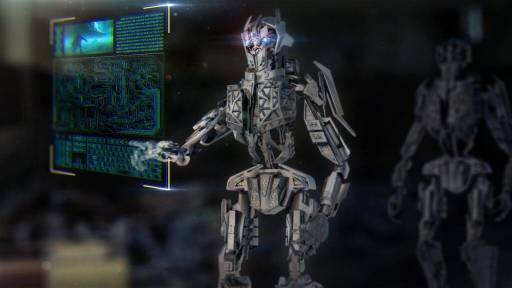Artificial intelligence, or AI, may sound contradictory, yet it actually advances technical advancements, boosts productivity, and automates procedures to make our society smarter. The formerly science fiction-only concept of AI is now starting to gradually affect how we conduct our daily lives. AI is being applied more and more in the world of digital marketing, improving pay-per-click advertising, personalizing websites, supplying content, forecasting behaviour, and other processes. In 2018, 84 percent of marketing firms will either start using AI and machine learning for the first time or enhance their current usage. Marketers are quickly becoming aware of the advantages of the technology.
Businesses can use AI in one of two ways to improve their digital marketing. One is when marketers employ AI to perform backend operations like programmatic ad buying, customer profiling, and demand estimation for clients. The second is the customer-facing element, where marketers use AI to improve the customer experience, hence boosting the brand’s recognition and revenue. In fact, 75% of companies that employ AI and machine learning assert that it boosts client satisfaction by more than 10%.
What is Artificial Intelligence (AI)?
The broad topic of artificial intelligence (AI) in computer science is concerned with developing intelligent machines that are capable of doing activities that traditionally require human intelligence. The phrase typically refers to the goal of building systems that have cognitive capacities similar to those of humans, such as the ability to reason, find meaning, generalise, or learn from experience.
How does AI transform digital marketing scenarios?
Several industries are being transformed by artificial intelligence. Brands are active in a wide range of industries, including technology, banking, and retail. Brands are now interacting with their audiences through artificial intelligence. It’s an experiment to see how conversational marketing affects their daily activities.
AI is making it possible for hyper-personalization through customised product recommendations, intelligent content recommendations, and suggestions for customer support as machine learning technology develops.
As a result, the way digital marketers link businesses to their audiences is evolving. We’ll now take a closer look at a few examples of how AI is transforming digital marketing.
Marketing that is highly targeted
A key aspect of focused marketing is persuading your potential customers to agree with you. How do you persuade someone you don’t know, though? using artificial intelligence (AI) in intelligent design for individualised customer experiences, consumer prediction segmentation, or virtual assistants. Traditional advertising is less effective than marketing that focuses on people based on their general preferences. Furthermore, thanks to the development of artificial intelligence, marketers may now use personalised data to assess a potential customer’s interest in making a purchase before asking for payment.
Marketing that is personalised and automated
Do you wish to completely automate your targeted digital marketing? You can, of course. Automation and artificial intelligence (AI) make for a great combination that results in highly individualised marketing. Businesses can significantly improve their competitive position in the client market, increasing sales in the wake of the pandemic. Automation using artificial intelligence (AI) technology is possible for pay-per-click (PPC) ads, display ads, conversion rates, search engine marketing (SEM), keyword research, SEO, and social media marketing (SMM).
Increase your knowledge of your customers.
AI helps companies analyse vast amounts of data and forecast each customer’s purchasing behaviour and decisions. You may now precisely market to a certain audience thanks to this. It also contributes to higher levels of consumer satisfaction. Additionally, in order to enhance conversions, marketers may simply turn a lead into a sale at the appropriate times using AI-driven methods.
Content marketing powered by AI
The secret to successful marketing is finding the right clients and communicating with them at the appropriate moment. This can occasionally be accomplished by carrying out market research to discover what people are worried about from a cultural and societal standpoint, as well as by looking at macro-level data about the target market, such as age group, income, and education level.
Separate the material and arrange it into something you can provide to your audience if you want them to read your message. In this case, artificial intelligence can be useful. The dissemination of content is increasingly using artificial intelligence. By finding themes that are likely to spark interest and providing content with a laser-like concentration on those subjects, it helps.
Artificial intelligence-powered customer relationship management
AI is essential to customer relationship management. Businesses can receive real-time insights about how customers interact through the various communication platforms they use. Before selecting the best course of action, users can automatically assign problems to the appropriate support group using statistical models. Chatbots may offer expertise through automated processes, which is a very effective technique to increase the clientele. Identify the prospects with the best potential of becoming customers by analysing consumer data, and then assist businesses in fostering these connections.
The future of digital marketing
More individualised marketing: As AI develops, algorithms will be able to infer psychological traits and demands from social media usage. It will also open up new possibilities for more specialised marketing. Only people who need their items will receive funding from businesses. Engaging customer service will result in more engaging and personalised customer service. Consumer support software called chatbots can perform a variety of activities, including answering customer questions, delivering information about products and services, and even driving sales.
Simple tools for finding and recommending products: Product searches and suggestions will be more accurate. Voice search is getting more and more common as AI technology advances. Many companies have started to experiment with augmented reality in an effort to improve the shopping experience for their customers. Customers will be able to view the products they are offering more clearly as a result.
Advanced data processing and analysis: In this situation, humans are unable to analyze enormous amounts of data in an efficient manner; here is where machine learning algorithms excel. As AI technology swiftly catches up to the volume of data collected, we can now use it to make better use of the data we collect. If you choose to disregard the benefits and possibilities of AI in marketing, your company will ultimately lag behind its competitors in a world where technology is becoming more and more significant.
Advanced artificial intelligence can be frightening, but marketing software that uses it is generally user-friendly and easy to integrate with existing systems. If you haven’t already, yesterday was the ideal day to explore the world of AI-powered martech. It has been established that AI is a useful tool for marketers. It has significantly sped up the process and altered how marketing is done. However, it still has to be much improved in terms of practicality and efficiency.

